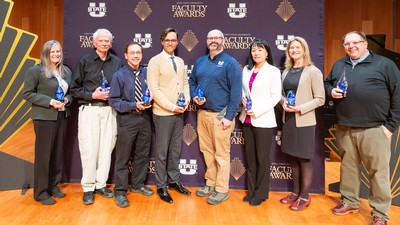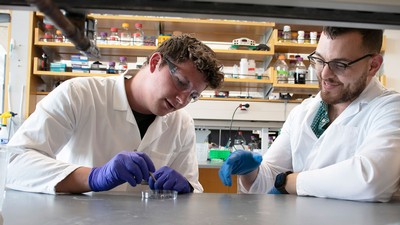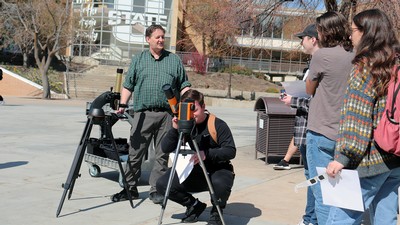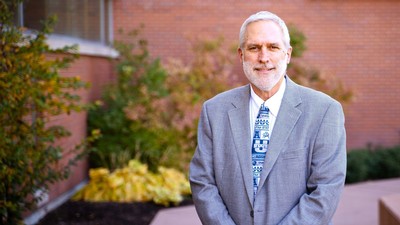Professor Guides Teachers to Success in Utah's Language-Immersion Program
Maria Luisa Spicer-Escalante (third from right) recently presented her Inaugural Lecture as a new professor of Spanish and linguistics. From left, Joseph Ward, dean of the college of Humanities and Social Work; Bradford Hall, head of the Department of Languages, Philosophy and Communication Studies; and USU President Noelle Cockett.
A youngster who learns a second language is an individual whose brain will never be the same.
When Maria Luisa Spicer-Escalante states this, she’s not thinking of a junior high classroom where students repeat Spanish vocabulary and fill out worksheets.
She’s talking about a student’s years-long absorption in foreign-language instruction that will be a foundation for writing, conversation, thought.
Her mission, she told colleagues and friends gathered to hear her Inaugural Lecture as a new full professor, is to teach the teachers so their love for and skill in a language is reflected in the daily lives of their young students.
Spicer-Escalante has been instrumental in the implementation of a Utah State Board of Education program designed to do just that: Dual Language Immersion. Hundreds of youngsters in first and second grades throughout Utah begin their learning careers with teachers who spend half the time teaching in a foreign language.
Spicer-Escalante, professor of Spanish and linguistics, described her career and accomplishments in her presentation as part of the Inaugural Lecture series, which is designed to honor and acknowledge a faculty member’s advancement to professor.
President Noelle Cockett, who hosted the event at the official president’s home, said the lecture series began in 2002 to “recognize those individuals who have reached the top rank in the academic profession, that of full professor.”
Spicer-Escalante explained that at nearly 200 elementary schools in Utah, students do traditional lessons like math but in Spanish (in 101 schools), Chinese (55 schools), French (27 schools), Portuguese (nine schools) and German (two schools). Russian was added just this year. A DLI program in Arabic is in the works.
Children in the first DLI classes in 2007 are now entering high school. Spicer-Escalante’s response was a role in developing the Spanish Bridge Program, which continues the dual-immersion experience to the college level.
While DLI program have proliferated across the nation, Utah maintains more than any other state. And with the addition of the now year-old Spanish Bridge Program, said Spicer-Escalante, “nobody in in the world is doing what we are doing.”
Spicer-Escalante, who joined the Department of Languages, Philosophy and Communication Studies in 2003, told well-wishers that her first professional goal as a child in the Mexican state of Michoacán was to be a saint.
But “sainthood was not for me,” she laughed. She moved from Michoacán, the site where millions of monarch butterflies winter each year, and moved to Mexico City. There, she said, she completed a bachelor’s degree in journalism and a master’s in Hispanic linguistics and worked as a writer with several newspapers as well as in the Office of the President in Mexico.
Spicer-Escalante said she jumped at an opportunity to teach Spanish writing in the United States. She soon wound up, however, in a Ph.D. program at the University of Illinois at Urbana-Champaign, where she met her future husband, J.D. Spicer-Escalante, a professor of Spanish at USU and expert in Latin American literature.
Spicer-Escalante and her colleague, linguist and principal lecturer Karin Dejonge-Kannan, created and now direct the Master of Second Language Teaching Program, an interdisciplinary degree that combines coursework in foreign-language education, bilingual and immersion education and English as a second language (ESL) and English as a foreign language.
Spicer-Escalante also continues her work with the State of Utah’s DLI program by preparing teachers whose proficiency in a language, with a focus on writing, allows them to not just teach a foreign language, but to teach in that language.
Spicer-Escalante is the recipient of two Fulbright grants: the Fulbright-García Robles U.S. Scholars-Global Teachers of English as a Foreign Language, for which she taught teachers in Mexico in 2016-2017, and the Fulbright Western Hemisphere Regional Travel Program, which sent her to work with language teachers in Brazil.
She said the success of the DLI programs is grounded in “support from the government, the business people, the community, the parents. All of us became aligned with this effort.”
Graduates of the Master of Second Language Teaching program teach DLI programs in several Cache Valley schools. These former students, she said, are “are becoming pioneers of what we do.”
For more information on Spicer-Escalante, visit her faculty page at https://lpcs.usu.edu/directory/faculty/spicer-escalante-maria
Writer and contact: Janelle Hyatt, 435-797-0289, Janelle.hyatt@usu.edu
Comments and questions regarding this article may be directed to the contact person listed on this page.






